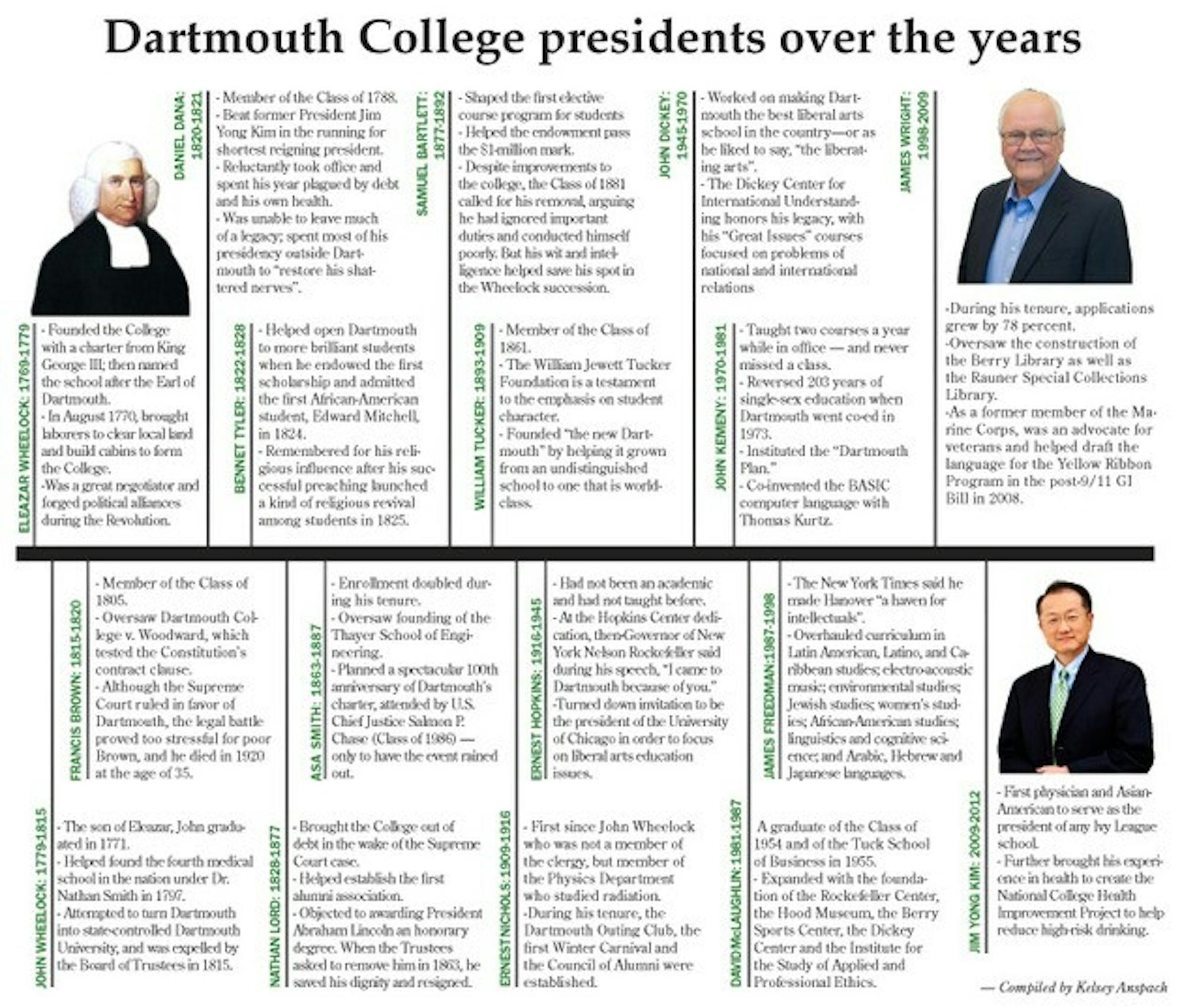1779-1815: John Wheelock-The son of Eleazar, John turned down an offer of admission from Yale University to become one of the first four students to graduate in 1771.-Always at the cutting edge of academic style, Wheelock helped found the fourth medical school in the nation under Dr. Nathan Smith in 1797.-Although he tried to keep Dartmouth's best interests in mind, Wheelock stirred controversy when he tried to convince the governor of New Hampshire to turn Dartmouth into state-controlled Dartmouth University, and was expelled by the Board of Trustees in 1815.
1815-1820: Francis Brown-Graduated with the Class of 1805.-Oversaw the tumult of the Supreme Court case launched by John Wheelock, Dartmouth College v. Woodward, which made history when it tested the Constitution's contract clause.-Although the Supreme Court decided in favor of the College, the four-year legal battle proved too stressful for poor Brown, and he died in 1920 at the age of 35.
1820-1821: Daniel Dana-Graduated with the class of 1788.-Dana beat former College President Jim Yong Kim in the running for shortest reigning president.-In the wake of the turmoil of the Supreme Court case, he reluctantly took office and spent his year plagued by debt and his own health.-Unfortunately, he was unable to leave much of a legacy; he spent most of his presidency outside Dartmouth to "restore his shattered nerves".
1822-1828: Bennet Tyler-Helped open Dartmouth to more brilliant students when he endowed the first scholarship and admitted the first African-American student, Edward Mitchell, in 1824.-Remembered for his religious influence after his successful preaching launched a religious revival among students in 1825.
1828-1863: Nathan Lord-Brought the College out of debt in the years following the Supreme Court case.-Helped Dartmouth build its legacy beyond Hanover through the establishment of the first alumni association.-As the nation entered the Civil War, his pro-slavery views came out when he objected to awarding President Abraham Lincoln an honorary degree. When the Trustees asked to remove him from office in 1863, he saved his dignity and resigned.
1863-1877: Asa Smith-Enrollment doubled during his tenure.-Further expanded the College with the founding of the Thayer School of Engineering.-Helped throw a spectacular 100th anniversary of Dartmouth's charter, attended by United States Chief Justice Salmon Chase '86 and General William Tecumseh Sherman only to have the event rained out.
1877-1892: Samuel Bartlett-Shaped the first elective course program for student-Helped the endowment pass the million-dollar mark.-Despite his improvements to the College, the Class of 1881 called for his removal, arguing that he had alienated faculty, ignored important duties and conducted himself poorly. But when he was charged by the Trustees, his wit and intelligence helped save his spot in the Wheelock Succession.
1893-1909: William Tucker-Graduated with the class of 1861.-Though he initially turned down the offer for presidency, the Trustees felt strongly enough to continue pursuing him until he finally accepted.-The William Jewett Tucker Foundation is a testament to the emphasis on student character.-Founded "the new Dartmouth": when he came in, the college was in debt, with 300 students and no central facilities; by the time he left, there were over 1100 students, 20 new buildings and a broadened curriculum.
1909-1916: Ernest Nichols-The first president since John Wheelock who was not a member of the clergy, Nichols was a member of the physics department who studied the measurement of radiation.-During his time here, some of Dartmouth's oldest traditions were set in stone, including the founding of the Dartmouth Outing Club, the first Winter Carnival and the establishment of the Alumni Council.
1916-1945: Ernest Hopkins-An unusual president in that he was neither an academic nor a professor, but spent most of his career in the business world. At the dedication of the Hopkins Center in 1962, then-governor of New York Nelson Rockefeller said during his speech, "I came to Dartmouth because of you."
1945-1970: John Dickey-Worked towards making Dartmouth the best liberal arts school in the country or as he liked to say, "the liberating arts".-The Dickey Center for International Understanding is a testament to Dickey's vision of a school with a global focus,; he also introduced the "Great Issues" courses and foreign studies programs.
1970-1981: John Kemeny-Taught two courses a year and never missed a class.-Reversed 203 years of single-sex education when Dartmouth went coed in 1973.-Formed our modern calendar when he instituted the "Dartmouth Plan."-As a math whiz, he helped invent the BASIC computer language with Thomas Kurtz and considered computer literacy as important as reading literacy, helping Dartmouth become a pioneer in the student use of computers.
1981-1987: David McLaughlin-Graduated with the Class of 1954 and from the Tuck School of Business in 1955.-Expanded the College in a variety of important ways with the foundation of the Rockefeller Center, the Hood Museum of Art, the Berry Sports Center, the Dickey Center for International Understanding and the Institute for the Study of Applied and Professional Ethics.
1987-1998: James Freedman-Overhauled the curriculum and established or revitalized programs in Latin American, Latino, and Caribbean Studies; Electro-Acoustic Music; Environmental Studies; Jewish Studies; Women's Studies; African-American Studies; Linguistics and Cognitive Science; and Arabic, Hebrew, and Japanese languages.
1998-2009: James Wright-During his tenure, Wright worked some kind of magic and helped applications grow by 78 percent.-Oversaw the construction of the place we now spend most of our time, Berry Library, as well as the Rauner Special Collections Library.-As a former member of the Marine Corps, Wright was an advocate for veterans and helped draft the language for the Yellow Ribbon Program in the post-9/11 GI Bill in 2008.
2009-2012: Jim Yong Kim-First Asian-American to serve as the president of an Ivy League school.-Created the Dartmouth Center for Health Care Delivery Science and the National College Health Improvement Project, bringing together 32 colleges to help reduce high-risk drinking.




